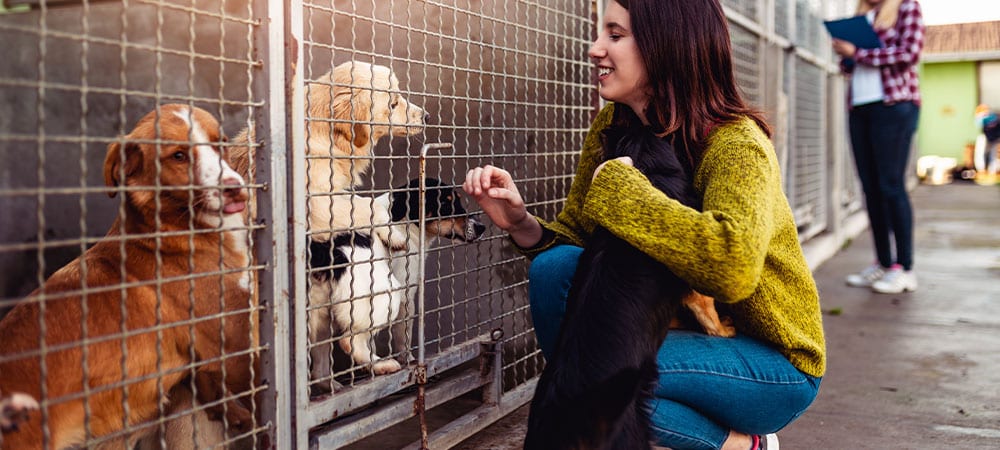Dos and Don’ts of Visiting an Animal Shelter


DON’T: Close your mind.
You probably have some requirements when looking for a dog, like size, shedding, and maintenance, but try to remain open to the possibilities. If you’re looking for your dog in a shelter, it’s unlikely you’ll be able to pick and choose the exact dog you want like you could from a breeder. That can be a good thing, though! You might be convinced you want a Labrador and end up falling in love with a Husky. You might be certain you want a puppy, and then realize an older dog will be an easier, more suitable companion. You never know who you’ll find in a shelter, so keep an open mind.
DO: Talk to the staff.
Most shelters will keep a sign on each dog’s door stating its name, breed, age, gender, and any other crucial details. This info can be very useful, but it will never tell you the full story about a dog. Staff members interact with the dogs on a daily basis and will likely be able to paint you a much better picture about the dog’s past, its current behavior, and how well it might fit into your life.
DO: Take your time once you’ve found an animal you want to meet.
If you find a dog you’re interested in, staff will most likely give you a chance to meet them in a larger space. Not every dog will be friendly right away, even if they’re your perfect companion. Many shelter dogs have had hard lives and may be slow to warm up to you—don’t make a snap judgment just because a dog seems shy or uninterested in you at first. Allow plenty of time for the dog to get used to your presence and your scent before you try to start petting or playing with them. Again, keep an open mind and be open to a wide range of possibilities on the first meeting!
DON’T: Open or enter an animal’s enclosure without permission from a staff member.
A surprising number of people simply try to walk into rooms with strange dogs, having no idea what their nervousness or aggression levels might be. Check in with staff before approaching the dog that catches your eye, and allow them to bring the dog out to you if you want to have a visit.
—————————————————
Dog Spotted is a website built for the ulti-mutt dog parent. They provide free access to expert-written content and you can submit questions to their experts at woof@dogspotted.com. You can see examples here and here. Plus, they have a shop small page where you can support small businesses while getting an exclusive promo code (who doesn’t love a discount?!).
If you’re on the lookout for a new dog and are in NYC – they’ve got you covered from items to have before you bring your new dog home and finding the perfect rescue with their comprehensive database. Last but not least, they host monthly free events where there are always giveaways and a great opportunity to meet other dog parents and experts. Be sure to check them out and you can follow them on Instagram too at @dogspotted.
Written by Dog Spotted
Visiting an animal shelter can be a great way to find your next pet. These days, more and more soon-to-be dog owners are choosing to rescue or adopt rather than purchase dogs from breeders. Breeders can be overly expensive and sometimes use questionable breeding practices, so finding an animal that needs a home from a reputable shelter is often the better option. But what’s the best way to go about your shelter visit? Here are five do’s and don’ts from a former animal shelter employee!
DO: Check out the shelters in your area online before you go.
First, use a quick Google search to make sure that the shelter you’re visiting is legitimate and has good reviews. Second, most shelters now keep a list of the animals they’re currently holding on their websites. Take a look at the animals they have and whether they meet your needs—for example, if you’re looking for a dog under 50 pounds and the shelter only has big dogs, you may want to try elsewhere. You can always call ahead to a shelter to confirm which animals they have as well, as the websites may take a day or two to update.



